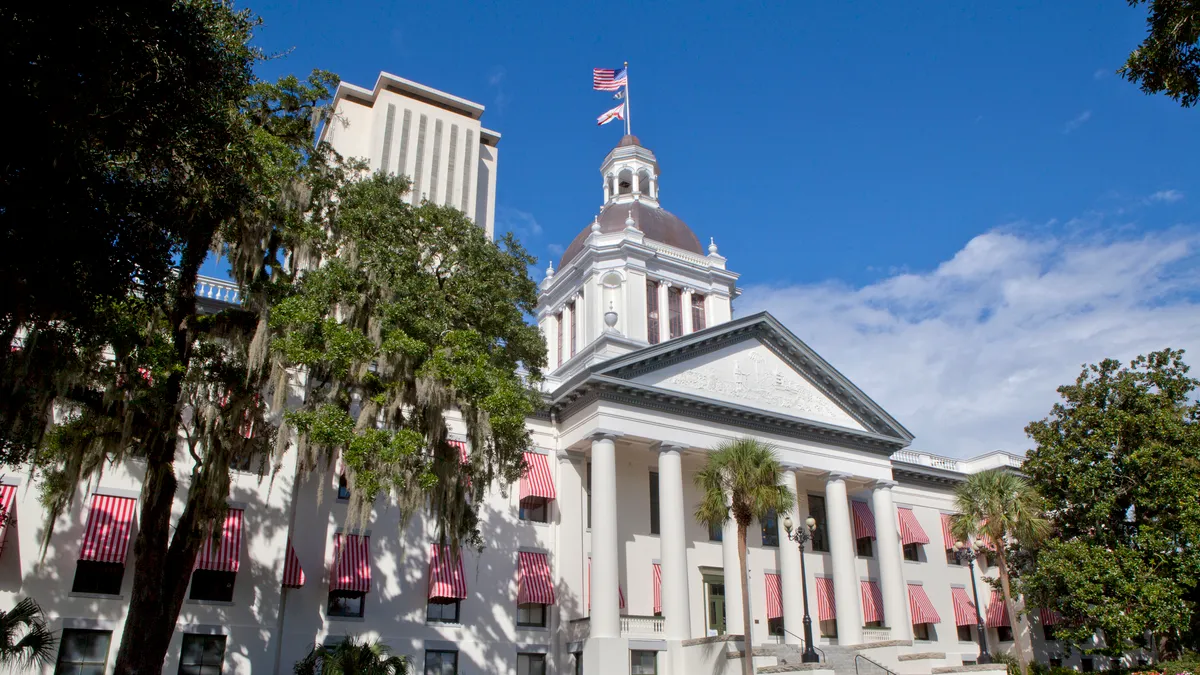While over a dozen states have passed legislation easing the path to getting a certified public accountant license in recent months, Florida’s initiative has been sidelined after getting stalled by a broader deregulation bill.
The Sunshine State’s initial CPA bill CS/SB 160 and its companion HB 133, would have added a new route to becoming a certified public accountant that doesn’t require 150 hours of college credit, effectively 30 hours beyond the typical bachelor’s degree amounting to a fifth year of college education. The bill would permit licensure for candidates in the state who obtain a bachelor’s in accounting/finance, two years of experience and pass the CPA exam. But on May 3 it was “indefinitely posted and withdrawn from consideration,” according to the Florida Senate website.
Instead, the bill was added to a controversial piece of legislation that would eliminate continuing education standards for CPAs, along with other professions such as engineers and architects, according to Shelly Weir, president and CEO of the Florida Institute of CPAs.
Exceeding 500 pages, the expansive deregulatory legislation, (HB 991) that was combined into SB110, would also get rid of professional and occupational boards, including the Florida Board of Accountancy, moving the responsibilities to the Department of Business and Professional Regulation, according to the FICPA.
“Unfortunately, in the Florida House, FICPA’s own priority legislation (which centered on expanding licensure pathways, introducing automobility and streamlining components of the licensure process) was placed into the larger de-regulation bill with the components we opposed that would be catastrophic to the profession,” Weir wrote in an emailed response to questions.
FICPA strongly opposed the deregulation legislation despite the inclusion of the CPA pathways options that it supported, Weir said. For now, while the deregulation bill did not pass the Senate, the Florida legislative session has been extended to June 6 and the bill still could advance this year, according to FICPA.
The association said it is closely monitoring the situation. “This proposal admirably aims to cut red tape, but goes too far by eliminating continuing education standards that are critical to professional development and alignment with national standards,” Weir wrote in a post on Florida Politics, noting that the CPA professional group is pro-business and supports efficiencies. “High-impact, technical professions require education and strong, efficient peer oversight from their peer Boards for good reason. Rigorous standards exist to protect the public from substandard work.”
Weir recently shared her views on her organization’s view of the CPA legislation and its prospects for passing in written responses to emailed questions from CFO Dive’s Maura Webber Sadovi. The exchange has been edited for clarity and brevity.
CFO Dive: Did FICPA support the CPA pathways bill (CS/SB 160) and what are the prospects for the initiative?
Shelly Weir: Yes, SB 160 by [Florida State Sen. Joe Gruters] and its companion measure (HB 133) were both FICPA priority legislation. We strongly supported these bills and the transformational positive change that the new pathways, automobility, and overall streamlining within the licensure process would bring to Florida CPAs and businesses. The bill and new concepts for pathways was very well received in the legislature. In fact, SB 160 was one of the fastest moving bills in the legislature, passing all committees of reference and passing the full Senate unanimously on March 19. We were having very productive and positive conversations with the House about a path forward to get SB 160 passed when the larger deregulation issue emerged, shifting the conversation and advocacy efforts to that issue for the final weeks of session. Unfortunately, the very good policies in SB 160 will not pass this year, but given the positive reception by the legislature, we are very optimistic that we can get it done in the next legislative session.
CFO Dive: What is the relationship between the deregulation legislation that would abolish the state’s Board of Accountancy that FICPA is fighting and the CPA pathways bill?
Shelly Weir: The FICPA is strongly opposed to the proposals to eliminate all licensing boards under DBPR, including the Board of Accountancy, and eliminate all continuing education for all professions and trades under DBPR, including CPAs...While we supported the good parts of the bill (i.e. the expanded pathways and mobility provisions), the good did not outweigh the bad. This in turn, caused the FICPA to have to ultimately oppose the bill in its entirety and put the full weight of our advocacy program behind protecting the profession from deregulation. We look forward to working with the legislature to get the new pathways, automatic mobility, and the self-identified streamlining efforts within the licensure process to the finish line next year.
CFO Dive: Decades ago, Florida was one of the first states to establish the 150-college credit hour requirement for CPA licensure. How did FICPA’s recent support for changing CPA licensure requirements evolve?
Shelly Weir: The filing of SB 160 and HB 133 to expand licensure pathways in Florida was the culmination of a multi-year effort to both educate our members on the issue at hand as well as capture their feedback. Between July 1 and Nov. 1, 2024, FICPA met privately with 76 office managing partners representing the Big 4, G400 group, regional firms, and small firms. We also conducted student focus groups, had joint meetings with the accounting program leadership of all major public and private universities in Florida, and held regional Town Halls with members from Jacksonville to Miami. At each step along the way, we had thoughtful dialogue with both our FICPA Board of Directors and the Florida Board of Accountancy. Lastly, we reviewed third party research that has been conducted on both the identified barriers and proposed solutions to the CPA talent shortage prior to drafting our legislation.
Prior to filing legislation, FICPA also launched the Bridge to CPA program — a first of its kind program that allows aspiring CPAs to enroll in the AACSB-accredited Macc program at Nova Southeastern University at no cost and no debt to the student. FICPA is committed to being future-focused and solution driven in our efforts to strengthen the accounting pipeline.























